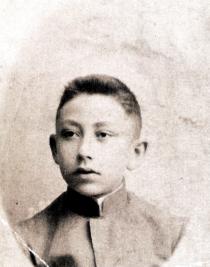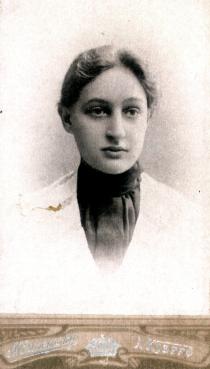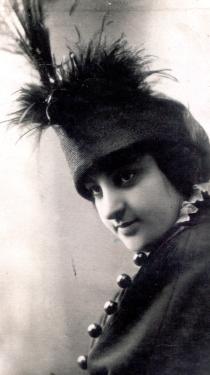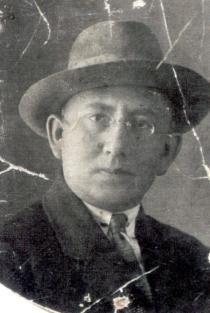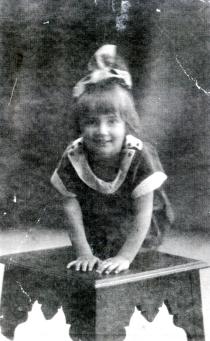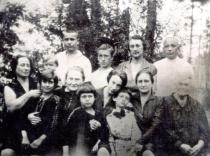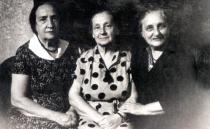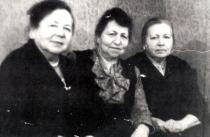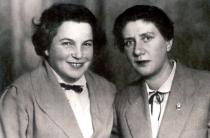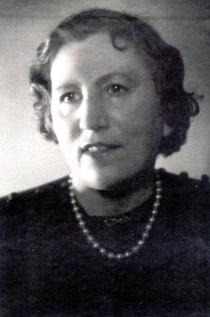
Izolda Rubinshtein
Chernovtsy
Ukraine
Interviewer: Ella Levitskaya
Date of interview: August 2002
My father's family lived in Uman. My grandfather on my father's side, Mendel Rubinshtein, was born in Uman in the 1850s. He died in 1914. My grandmother, Beila Rubinshtein, was born in Uman in 1854. My grandmother took an active part in public life. My father told me that she was a Zionist when he was a child (I don't know any details about her activities)and did charity work at the children's home for Jewish children. She was always involved in some other activities. She was very sociable. Even as an old woman she was still beautiful. She wore a brown wig. I don't know whether she wore a wig due to her religiosity or because she wanted to hide her thin hair when she was old. She had an artificial eye, which gave her a strange expression. I felt awkward in my grandmother's presence. She was very sociable. During her visits she made acquaintances and often went out. She died in Uman in 1931.
Uman was a small provincial town in Cherkassy province. In the 17th century Uman belonged to Poland; to the Polish family of Prince Pototski. Pototski built the Sofievka park in Uman, named after Prince Pototski's wife Sofia, a Greek woman. This park is a beautiful creation of park architecture. There is a cascade of lakes, beautiful fountains and sculptures in this park. It's a remarkable place of interest, even nowadays. In 1793 Uman became a part of the Russian Empire. There were Jews, Ukrainians and Poles in Uman. Jews were mainly craftsmen. Uman was in the Pale of Settlement 1, so many of them lived in this town. There were several synagogues, an Orthodox Christian church and a Catholic cathedral. There were grammar schools and Russian and Jewish secondary schools. At the end of the 19th century a railroad was built in Uman to provide transportation to Kiev and Odessa.
My father didn't tell me anything about the house of his parents. When I grew up I went to Uman. I looked at the old houses and talked with old Jews that had lived in Uman before the war hoping that one of them would have known the Rubinshtein family. But none of them did.
My father, Peter Rubinshtein, who was named Pesach at birth, was the youngest child and the only son in the family. He was born in 1889. He had three sisters: Zina, Sonia and Rita. I only know that they were older than my father. My aunts were pretty and cheerful women. They all knew Yiddish, but they almost always spoke Russian. They finished a Russian lower secondary school in Uman. Sonia studied at the accounting school and got a job later. Zina got married to the chief engineer of the distillery in Kharkov and was a housewife. She took her husband's last name: Skupnik. Rita, whose married name was Shapiro, was a housewife.
My father's parents must have been religious like all traditional Jewish families in small towns. My father told me very little about his life in Uman, and I just put together the bits and pieces of information that I got.
My father studied at cheder. He didn't enjoy studying. He missed classes and misbehaved during lessons asking the melamed all kinds of questions. His teacher used to tell my father to take off his shoes to keep him from running away. My father escaped barefoot. He never accepted religion, not even in his childhood. He said he didn't learn one single prayer by heart although he had a good memory. He wasn't interested in religious books, but he read a lot of fiction. My father attended cheder until he turned 13. He had a bar mitzvah, and his parents arranged a party at home on this occasion.
My father's parents celebrated Jewish holidays. My father said that he always managed to get the food that my grandmother made for the festive dinner at the end of fasting on Yom Kippur and ate as much as he could. His parents told him off but he was stubborn. I don't know whether my grandparents celebrated Sabbath. I believe they did.
My father was eager to study. At the age of 13 he went to the 1st grade of the Russian grammar school in Uman. He studied so well that he passed his exams for the first two years of school without even attending the 2nd year. He finished 8 years of grammar school in 3 years at the age of 16. He finished it with honors. It enabled him to enter any higher educational institution in tsarist Russia without entrance exams. He entered the Faculty of Philosophy and the Faculty of Psychology at Novorossiysk University [1,200 km from Kiev in the south of Russia]. At that time the percentage of Jews at higher educational institutions wasn't to exceed five percent 2 of the total number of students. My father graduated from both faculties in 1911. He had only one 'good' mark in Russian literature and 'excellent' in all other subjects at both faculties. My father was one of the best students at the university and he was offered a job as a lecturer. The only condition was for him to accept Christian faith and get baptized. My father refused and got a job in Vilnius, where he could become a lecturer without getting baptized. He lectured on philosophy at the grammar school in Vilnius. He worked in Vilnius until 1915.
I know more about my mother's family. I was born and grew up in the house of her parents in Podol 3, in Kiev. My grandfather, Israel Kapnik, was born to the family of a merchant of Guild II 4 in Kiev in 1855. Only certain categories of Jews were allowed to live in the city, including merchants of Guild I and II and doctors. My grandfather's father built a huge five-storied brick building in Podol. There was a store for manufactured goods on the first floor, owned by my great-grandfather. My grandfather purchased consumer goods in Budapest and Paris. My great- grandfather's family lived on the second floor. The remaining apartments were leased.
My grandfather was the oldest son and inherited the house from his father. He became a merchant of Guild I. He died in 1912. My grandmother, Clara Kapnik, was my grandfather's second wife. He had many children from his first marriage. After his first wife died he got married a second time. My grandmother came from Kiev. She was born in 1865. She was a very smart and business-oriented woman. After my grandfather died she took over his business and managed very well. After the Revolution of 1917 5 the Soviet power took away their house. My grandmother and the children stayed in three rooms. The store was expropriated, and my grandmother remained with no means of living. The children helped and supported her. My grandmother died in Kiev in 1928. She was buried in the Jewish cemetery in Kurenyovka in Kiev. In the 1960s this cemetery was closed. My grandmother's ashes were removed to the Jewish section of the Lukianovka cemetery.
My grandparents had six children. My mother, Sofia Kapnik, was born in 1892 and she was the oldest child. She had three sisters and two brothers. My mother's first sister, Sarra Kapnik, moved to Leningrad from Kiev. She was a biochemist. She had a problem with her legs and couldn't walk properly. When she retired she moved to Moscow. My mother's second sister, Zhenia Broide [nee Kapnik], worked at a shop in Podol until she retired. She embroidered blouses and handkerchiefs. She had two sons and a daughter. Her sons graduated from the Electro-Technical Faculty of the Polytechnic Institute. They were engineers. Her daughter also studied at the Polytechnic Institute but fell ill with meningitis when she was a 3rd-year student. She recovered, but she became handicapped. As for my mother's third sister I don't remember anything about her.
New One of my mother's brothers, Grigory Kapnik, had a beautiful wife called Bella. Their daughter, Maria, a very pretty and talented girl, moved to Germany in 1925. She lived in many countries. She married a Frenchman. Her parents were against her marriage. The bride and bridegroom signed a wedding contract according to which Maria was to receive nothing in case her husband died. It was a civil contract. Since her husband was French they couldn't have a ketubbah. Her husband died at 40. Maria got a job as a shop assistant at a women's underwear store and then at a cosmetics store. She didn't keep in touch with her parents. They never accepted her marriage with a non-Jew, and she could never forget that they didn't. They found her through the French police. In 1976 she sent me an invitation to come to Paris. I visited her. She lived in a small apartment in the center of Paris. It was nicely furnished. She had beautiful clothes. She loved Paris and always spoke nicely about it. She had many Jewish and Russian friends among the immigrants from Russia. She spoke Russian and French, and there was nothing Jewish in her life. Two years ago I received a letter saying that she had got in a car accident and died. She didn't have any children.
New There was another brother whose name I don't remember. He finished school and worked as a shop assistant at a store. He had a daughter and a son. His son's name was Igor. He perished at the front during the war. My mother's brother and all other members of his family were exterminated at Babi Yar 6. Their family name, Kapnik, is in the Babi Yar memorial book.
My mother's family was a traditional Jewish family. Her parents went to the synagogue every Saturday. They celebrated Sabbath and all the Jewish holidays. Her parents went to the synagogue every Saturday. My mother didn't tell me any details. When I was growing up it wasn't safe to talk about such things because the Soviet power struggled against the bourgeois and religious past. If a child blabbed about his wealthy ancestors, it might have been interpreted as nostalgia for the tsarist regime, and the whole family might have been arrested or executed. They spoke Yiddish in the family, but they all knew Russian well. My mother's parents believed that girls were to learn to be good housewives. They were a patriarchal family. The boys went to cheder and the girls got religious education at home.
My mother took little interest in housekeeping. She was fond of reading. She read in Yiddish and Russian. She prepared for the grammar school by herself. She was the first child in the family and my grandfather was spoiling her more than the other children. My mother convinced him to send her to grammar school. He gave in, and she was the only girl in the family who finished grammar school. The rest of the children studied at a secondary school. My mother's sister Sarra was the only one to get higher education. She finished the Leningrad Institute of Chemical Industry in the 1930s.
Once my mother told me about Jewish pogroms in Kiev. My mother was a young girl. Once she walked to Podol from Kreschatik [the main street in Kiev]. She reached Kontraktova Square in Podol in the midst of a pogrom. She was wearing a hat. A man approached her, grabbed her hat and threw it on the ground. My mother yelled, 'How dare you?', although she was always shy. He stared at her, and she ran away taking advantage of his momentary confusion. There was nobody around, and she might have been hurt. My mother knocked on the door of a Ukrainian house, and they let her in. This family sent their housemaid to my mother's home to inform her family where she was. My mother's brother came to pick her up. She changed into peasant's clothes and went home.
My parents met at the theater. My father came to Kiev on the invitation of Kiev University to lecture on psychology. My mother was a very elegant woman. She wasn't a beauty, but she was attractive. My father was a very handsome and elegant man. They fell in love with each other and got married in 1915. They had a small wedding party. They didn't have a Jewish wedding ceremony. After the wedding my father moved to Kiev. He became a lecturer on psychology at Kiev University. There was no anti-Semitism, and he got this job easily. My mother was a housewife.
My father was very enthusiastic about the Revolution of 1917. He believed revolutionary ideas to be the expression of justice. He was 30 and a professor of psychology. He was the youngest professor at the university. He was called a 'red professor', probably because of his devotion to Soviet ideas.
My parents rented a small two-bedroom apartment in Shevchenko Boulevard in Kiev. It's a very beautiful street lined with Lombardy poplar trees.
I was born in Kiev in 1920. I was called Izolda after my mother's father, Israel. I was the only child. I lived in Kiev the first three years of my life. I have no memories of this period. In 1923 my father was offered a job in Kharkov. He was to be a lecturer at Kharkov University and take part in the development of optimal psychological occupational recommendations. He agreed, and we moved to Kharkov. Kharkov was a big industrial and cultural center. It was the capital of Ukraine at that time. There were few Jews in Kharkov and they were assimilated Jews like my parents.
We spoke Russian in the family. My parents were atheists. Or, to be more precise, my father was a convinced atheist. He didn't observe any Jewish traditions, and we didn't celebrate any Jewish holidays. My mother tried to observe some Jewish traditions. She didn't go to the synagogue, but she fasted on Yom Kippur. When we managed to get some matzah on Pesach my mother only ate matzah. But she had bread for me and my father for Pesach. I wasn't raised Jewish. My parents believed religiosity to be a vestige of the past. They didn't teach me Yiddish for the same reason. They weren't party members, but we always celebrated Soviet holidays in our family: 1st May and 7th November [October Revolution Day] 7. My mother made a festive dinner, and we had guests. They were mainly my father's colleagues. We also had birthday parties.
My mother always tried to look nice at home. She wore stylish blouses and a suit. My father tried to convince her to wear different dresses, something more casual, but my mother believed that a professor's wife should wear austere clothes.
I remember our house in Kharkov. It was a big house. We lived in two rooms and had a balcony. It was a big communal apartment 8 with a common kitchen. There was the family of a shoemaker who lived there. A Jewish family, the Rudayevs, the secretary of the Academy of Sciences also lived in two rooms. Rudayev was a very talented and interesting man. In 1937 he was arrested [during the so-called Great Terror] 9 and perished in a labor camp. The son of his first wife, Lyonia Rudayev, was very talented. After finishing school he entered the Polytechnic Institute. The management found out that his father had been arrested and expelled him from the institute. He managed to find a job as a secretary at a lawyer's office and entered the Law Faculty at Poltava University. He studied there by correspondence. He had a heart disease, but that didn't stop him from going to the military registration office on the first day of the war and volunteer to the front. He sent us a telegram reading, 'Hi and farewell'. Lyova perished near Belaya Tserkov. His family couldn't evacuate because his grandmother was paralyzed and couldn't be moved. They were a nice family. My schoolmate saw the Germans shoot Rudayev's son and daughter in the street. His wife and mother perished during the mass shooting of Jews in Kharkov.
I started Russian secondary school in 1927. My father took me to school on 1st September. He didn't give me any pre-school education. He thought I would get bored at school if I learned to read and write before school. There were two first classes at school: one for more intelligent children, who could write and read already, and one for those who started from zero. I happened to be in the class for less intelligent children. There were a few handicapped children in this class. My teacher didn't like me from the start. She was our teacher for four years, and I came to hating school. In the 2nd grade my parents arranged for me to go to a private dancing school. My teacher wrote an irate letter to my parents telling them that they weren't raising their daughter properly. I hated her for that. The school I went to was for the children of party officials. The children of commanders Yakir 10 and Kossior 11 studied at this school.
New Director Pavel Tutovskiy was the former director of the grammar school. He always wore a black suit to school, and he had a notebook with all our names in it. He was a geography teacher. Whenever he called my name to answer something I almost fainted from fear. When I was finishing the 8th grade I had a nervous exhaustion. My father arranged for my transfer to another school. The discipline in my former school was very strict, but in my new school we were allowed to be ourselves. We were naughty and missed classes, but we liked our teachers and school. Our teachers treated us very nicely. There were several Jewish children in my class, but at that time this wasn't important to us. There was no anti-Semitism. I remember Mikhail Zeldovich, one of our teachers - he was a Jew. The teacher of mathematics, Mikhail Gerasimovich, also a Jew, became a doctor of mathematics and professor at Kharkov University. His son lectures on mathematics at this university now.
At school I became a Young Octobrist 12 and a pioneer. I don't have any memories about these years. But I remember one terrible and shameful episode. When I was a pioneer a newcomer came to our class. Her name was Inga Zegel. I shall never forget her. At that time it wasn't recommended to have Christmas trees at home. It was believed to be a bourgeois tradition and a disgrace for a pioneer. We found out that she had a tree at home, and had an all-school meeting to condemn her and expel her from the pioneer organization. It was a terrible shock to her. An ambulance took her to hospital right after this meeting. She stayed in hospital for a few weeks with a nervous breakdown. Later her parents took her to another school, and I never saw her again. We didn't have a Christmas tree in our family before. It was forbidden by Soviet authorities as a vestige of the past, but it was allowed again in 1937. But since then I've never had a Christmas tree at home. When I see a Christmas tree I feel awful because I remember that terrible incident many years before.
My favorite subject at school was Russian literature. I always liked to read. But I never liked performances in public. Once I was to recite a poem at the schoolchildren's concert. My parents were in the audience. I came onstage, announced the title of the poem and left. My parents didn't scold me for this failure, but ever since then I hated any public performances.
In 1936 [during the Great Terror] arrests of the people began. It never occurred to my parents or me that there might have been something wrong. We believed everything the official propaganda was saying about Stalin. I told you the story of Rudayev, our neighbor. When he was arrested we were shocked, but not because an innocent man had been arrested, but because our neighbor was an 'enemy of the people' and we didn't really know that. Many of my father's friends were arrested, and we had no doubts that they were guilty. My parents always believed what the Communist Party said. When somebody we knew was arrested it never occurred to us that he was innocent. We thought, 'What could he have done?' I don't remember whether any of my classmates' parents were arrested. But I remember something else. We met in Kharkov on the 50th anniversary of finishing school. And one of our classmates said, 'Just think about it: none of us was ever arrested. This means, there were no traitors among us'.
I finished school in 1937. I wanted to become a doctor. Now I know that I would have been a miserable doctor: I can't stand the sight of blood and I'm very sensitive, but I always wanted to provide help to people when they needed it. My classmates voted for me to go to a Philology Faculty and their opinion was of the utmost importance to me. A collective's opinion generally was of greatest importance at that time. There were meetings and the collective determined what a person was going to do. I entered the Philology Faculty at Kharkov University. I became a Komsomol 13 member at university. When I was a 3rd-year student I became secretary of the Komsomol unit. I conducted Komsomol meetings and collected Komsomol fees. The good part of my profession is that my pupils remember and visit me.
In 1938 my father received an apartment. We were very happy to move there. My father got a job at the Kharkov Institute of Psychology and Pedagogic. He also lectured on psychology at the university. My father was an outstanding psychologist in Ukraine. His thesis was among the 13 best in the former Soviet Union. He worked on the issues of flight with no lighting, psychological pressures in aviation and psychology of driving in difficult situations.
In 1939 the fascists attacked Poland. [Editor's note: The interviewee refers to Germany attacking Poland, which was the beginning of WWII.] People discussed this and got nervous about the situation. People talked a lot about how the Germans viewed Jews. There weren't many Jews in Kharkov, and people weren't concerned about the situation in Europe. We didn't believe that we might be at war with the Germans. We were hypnotized by the official propaganda continuously telling us that our country was the strongest in the world and that all our enemies would be defeated. There were many military trainings, and this also gave us confidence in the military strength of our country.
Once, in the spring of 1941, my father received a big amount of money for the publication of his book. On Sunday, 22nd June 1941, we went to a shop to order several dresses to be made for my mother. My father waited for us in the park where he heard about the beginning of the war. He came into the shop, took us outside and told us that the war had begun.
I had a friend at the university. His name was Tolia Yakimenko. A few days before the war we passed our exams for the 4th year. Tolia decided to work as a pioneer tutor at a pioneer camp during the summer vacations. He was a sportsman and a good swimmer. Tolia took the children to the river and decided to do some diving in the river. He dived and dived. It turned out there was a high spot in the river. He hit it and died. His funeral was on 23rd June. On this day we had to be at the Komsomol meeting at the university at 2pm. Attendance was obligatory. We had to leave before the funeral was over, and I can still hear his mother screaming, 'Tolia, your friends are leaving'.
When the war began we started gluing paper crosses on the windows. Kharkov was bombed for the first time in July 1941. I went to see my friend, who volunteered to the front. At that time the air raid began. I was far from home and walked all the way home with bombs exploding all around.
We evacuated at the beginning of the evacuation period. My father's sister Zina and her daughter, who had just got married, went with us. Her daughter's husband was chief engineer at the Kharkov railcar factory, so we evacuated with the factory. We had very little luggage although there were no restrictions as to the luggage we could bring with us. My father took our clothes out of the suitcases and put books there instead. My mother took three antique cups. We didn't realize that we would be leaving for long.
Our train wasn't bombed. We were approaching Ponyri station. There was another train ahead of us. When it stopped all passengers went to get some bread at a store. When our train stopped at the station we saw dead people close to the store. They perished during the air raid.
Our trip took about a month. We reached Alma-Ata [3,000 km from Kharkov, in Kazakhstan]. My father decided to get off in Alma-Ata because there was a university in this town, and he was hoping to get a job. The secretary of the Central Committee of the CPSU of Alma-Ata issued an order to allow evacuated people stay in Alma-Ata. My father went to see him and we got permission to stay.
A very nice Russian family called Kochergin gave us shelter. Kochergin was a Candidate of Geography Sciences and a lecturer at the Alma-Ata University. His family was very kind to us. In Alma-Ata my father became head of chair of psychology at the Pedagogic Institute. He wrote a book called The Basics of Psychology while working there.
It was a hard time. I remember a tragic episode. I met my co-student from Kharkov University. I was very happy to see her. We heard on the radio that Kharkov and Kiev Medical Institutes evacuated to Kzyl-Orda [in Kazakhstan]. They were admitting students. She and I decided to go there. I had friends there and stayed with them. She went with her mother, and they rented a room. After two days this girl died of typhoid. We couldn't get a coffin to bury her. We got a wardrobe and put her in this wardrobe. It was winter, and we were too weak to dig a grave. We buried her and returned home. We sat down and the first words that somebody pronounced were, 'Who is next'. And then Vera Nazariantz, Armenian and a beauty, stood up shocked and began to dance a folk dance. She had her hair loose and she danced liked crazy! By the way, she doesn't remember this, but we do. We were watching her, and then we said, 'We shall live!'. Vera became deputy director of the Public Library in Kharkov. We are still very good friends. She lives in Australia now.
I entered the 5th year of the Philology Faculty at Alma-Ata University. In 1943 I passed the final exams successfully and graduated from the university. There were no vacancies for me, though. I was offered a job as a Russian teacher in China. I gave my consent, but my parents talked me out of it. Once my father talked about me to his student. She told him that there was a vacancy at the Cinematography College, and I became a teacher of Russian language there.
In 1944 my father obtained all necessary documents to go back to Kiev and resume his position at the Institute of Psychology. We returned to Kiev, and my father got a job with the Institute of Psychology and the Institute of Physical Culture. We stayed at the hotel, and the institute paid our hotel bills. I couldn't find a job, because there were only a few schools open. My mother found a job as a bibliographer at a book center. She was very happy to get this job. My father had a lot of work. He did a lot of consulting work and worked at the Ministry of Transport. He submitted the book that he had written in evacuation for publication. But in 1946 my father died from infarction during a meeting at the Council of Ministers. He was buried in the cemetery. It wasn't a Jewish funeral.
Shortly after the funeral I went to the Ministry of Education located in Kreschatik. Kreschatik was still in ruins, and German prisoners were working on its clean up. I met with the minister and explained my situation to him. There was a newspaper with an obituary of my father on his desk. He said he would see what he could do. He helped me to get a job in the center of Kiev. I was a teacher of Russian language and literature.
After my father died my mother received a pension for him. This pension was a few times more than my mother's salary, but to receive it my mother had to quit her job. She did.
My father's book, The Basics of Psychology, was published, but the author's name was different. I had given directions for the publication of this book to Kostyuk, the director of the Institute of Psychology. After some time I went to ask him about the news, and he said that I hadn't given him anything. Within a year's time this book was published under the name of Kostyuk. I was so upset, but I couldn't prove anything. But this is all the past. I never tried to fix this injustice. Time has passed, and this book has been forgotten.
I took a post-graduate course at the university in Melitopol. I was writing a thesis entitled Rare publications of Turgenev 14. My thesis was almost finished, and I was about to take my exams, when the campaign against 'cosmopolitans' 15 began. This happened in 1948. Teachers, journalists and writers of Jewish nationality were accused of cosmopolitism and fired. I was to take an exam in 19th century literature. Before I went to the exam an order was issued to give me an 'unsatisfactory' mark for neglecting Soviet literature. There were no 19th century literature teachers at the exam. The night before the exam my tutor, a very decent and kind man, and I worked on the questions that I might be asked at the exam. I answered my first question at the exam and was told that it was wrong. I demanded that they put down my answers in writing. They had to put a 'good' mark regardless of their intention to give me a bad mark. My next exam was French. My French teacher was given the choice of either giving me a bad mark or being fired as 'an individual that was under the occupation during the war and might have cooperated with Germans'. If this had happened she might not have been able to get another job whatsoever, because this accusation would have been difficult to refute. I heard about this from my tutor. But there was a new head of chair appointed shortly before. He came to the exam and listened to my response. He gave me a 'good' mark. The management of the post-graduate course decided to give me additional work with students such as seminars and classes. I didn't have enough time left for doing my own work.
NBut the last drop for me became the anniversary of Gogol 16. I made a speech and then a representative of the chair was to read my letter of reference. Khitrov was to read it, and I couldn't believe what I heard, 'Untalented, lazy, etc.' The attendants requested an explanation from him, and he said that he had written two references, but read the wrong one by mistake. My nerves failed me, and I decided to quit. This was the first and the last time in my life that I faced open anti-Semitism. I returned to Kharkov where my mother had gone before. It was impossible to find a job.
In 1952 someone told me there was a vacancy of a teacher of Russian literature at the Pedagogical Institute in Chernovtsy. I went to Chernovtsy. We were told that the city had remained almost intact. It was a cultured European town. There was a university and theaters. In November 1918 Bukovina became part of Romania. Chernovtsy used to be a Jewish town. After the Romanians came to power some Jews left Chernovtsy. But even then the Jewish population still constituted over 60 per cent. There were about 65,000 Jews out of 105,000 people living in Chernovtsy. Jews had great opportunities. They were allowed to build big stone houses in the center of town. Jews investing money in the development of industries or culture were exempt from tax for 20 years. Yiddish was spoken in the streets as often as German or Romanian.
However, I didn't get this job at the institute. . I don't know whether it was an expression of anti-Semitism or not. I was desperate and decided to write to Khrushchev 17. He helped me. It was an exclusive case when an official of such a high level got involved in the affairs of common people. At first I got a job at the Industrial College, but later this job was claimed by the daughter of the secretary of the regional executive committee. I was transferred to a Ukrainian school. I was a teacher of Russian literature and language at this school from 1953. My mother joined me in Chernovtsy. We received a three-bedroom apartment in the center of the town.
In 1953 the Doctor's Plot 18 began. This was the outburst of anti- Semitism. I was so depressed that I was hardly touched by the death of Stalin. I was only glad that my father died unawares, because Stalin was his idol. The speech of Khrushchev at the Twentieth Party Congress 19 in 1956 came as a shock. I thought that it must have been a mistake and what Khrushchev said couldn't be true.
I didn't face any anti-Semitism during my life in Chernovtsy. I worked at a Ukrainian school. It's difficult to say whether I made the right choice back then. My pupils didn't forget me. The good part of my profession was that my pupils remembered and visited me. They were all Ukrainian children, but they visited me. This school was my family, and I gave all my warmth and care to the children.
I don't want to discuss my personal life. Work at school took all my time. My mother did all the housework. We were very close. We didn't observe any Jewish traditions. We celebrated Soviet holidays. Regretfully, we were always busy. I wish I had asked her more about her life. My mother died in Chernovtsy in 1972. I buried her in the town cemetery in Chernovtsy, which isn't a Jewish cemetery.
In the 1970s many Jews were leaving for Israel. When I heard about the first emigrants I thought they were traitors. I couldn't understand why they were leaving. My friend moved there. Before she left we had a conversation. I didn't call her a 'traitor' but she knew what I thought. I told her that I couldn't understand how she could leave her motherland for a strange country hoping to acquire a new motherland. I said that there was only one motherland. I was a class tutor at my school and a boy from my class also left. We condemned him at a class meeting. Later I changed my opinion about Israel and the people that wanted to live there and build their own country. However, it isn't an option for me - I was born here and will die in my country.
In 1994 I got an invitation to Israel from my friends. It's a very interesting country. We traveled to the Dead Sea, and I saw sand dunes on the way. I was in 13 towns and saw a lot. I have many friends in Israel, and they were all happy to see me. Someone I cared for a lot left for Israel two years ago. He calls me every second day. I watch the situation in Israel very closely. I'm very concerned about my friends. But I'm very attached to my land and cannot imagine myself living anywhere else.
I don't know any Jewish traditions and that can't be changed. I'm an atheist and a cosmopolite. I share the joys and sorrows of the people around me.
I retired in the early 1990s. I got in touch with the Jewish Fund in Chernovtsy and began to conduct 'Friday meetings' for aging people. We arrange lectures on art and literature for them. I've been with this club for over ten years. Later we organized 'Sittings' for old people, especially lonely people. It's a wonderful opportunity for them to get together with friends for a cup of tea and a nice chat. I'm also a member of the board at Hesed. I am also Chairman of the Social Commission. I have many friends at Hesed. I'm happy to be with my people.
Glossary
